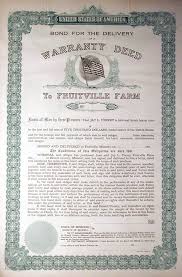记忆方法
deed--------"地的"----地契
中文词源
deed 行为,契约
来自PIE*dhe, 做,树立,放置,词源同do, fact. 用于指行为,契约。
英语词源
- deed
-
deed: [OE] Etymologically, a deed is ‘that which is done’. An ancient word, it can be traced back as far as a hypothetical *dhētis, a noun derived from *dhē-, *dhō- ‘place, put’, the Indo- European base from which do comes. This passed into Germanic as *dǣdiz, which produced German tat, Dutch daad, and Swedish dåad as well as English deed. The word’s application to a legal document is a 14th-century development.
=> do - deed (n.)
- Old English dæd "a doing, act, action, transaction, event," from Proto-Germanic *dædis (cognates: Old Saxon dad, Old Norse dað, Old Frisian dede, Middle Dutch daet, Dutch daad, Old High German tat, German Tat "deed," Gothic gadeþs "a putting, placing"), from PIE *dhetis (cognates: Lithuanian detis "load, burden," Greek thesis "a placing, setting"), from *dhe- "place, put" (see do). Sense of "written legal document" is early 14c. As a verb, 1806, American English Related: Deeded; deeding.
权威例句
- 1. The perpetrators of this evil deed must be brought to justice.
- 必须将参与这一恶行的凶手绳之以法。
- 2. Smith changed his name by deed poll to Jervis-Smith.
- 史密斯通过单边契据将自己的名字更改为杰维斯&dash1;史密斯。
- 3. A man's deed is the touchstone of his greatness or littleness.
- 行动是一个人伟大或者渺小的试金石.
- 4. You are not going to fool me into such a deed.
- 你不要哄骗我去干那种事.
- 5. He would be incapable of committing such a cruel deed.
- 他不会做出这么残忍的事.

